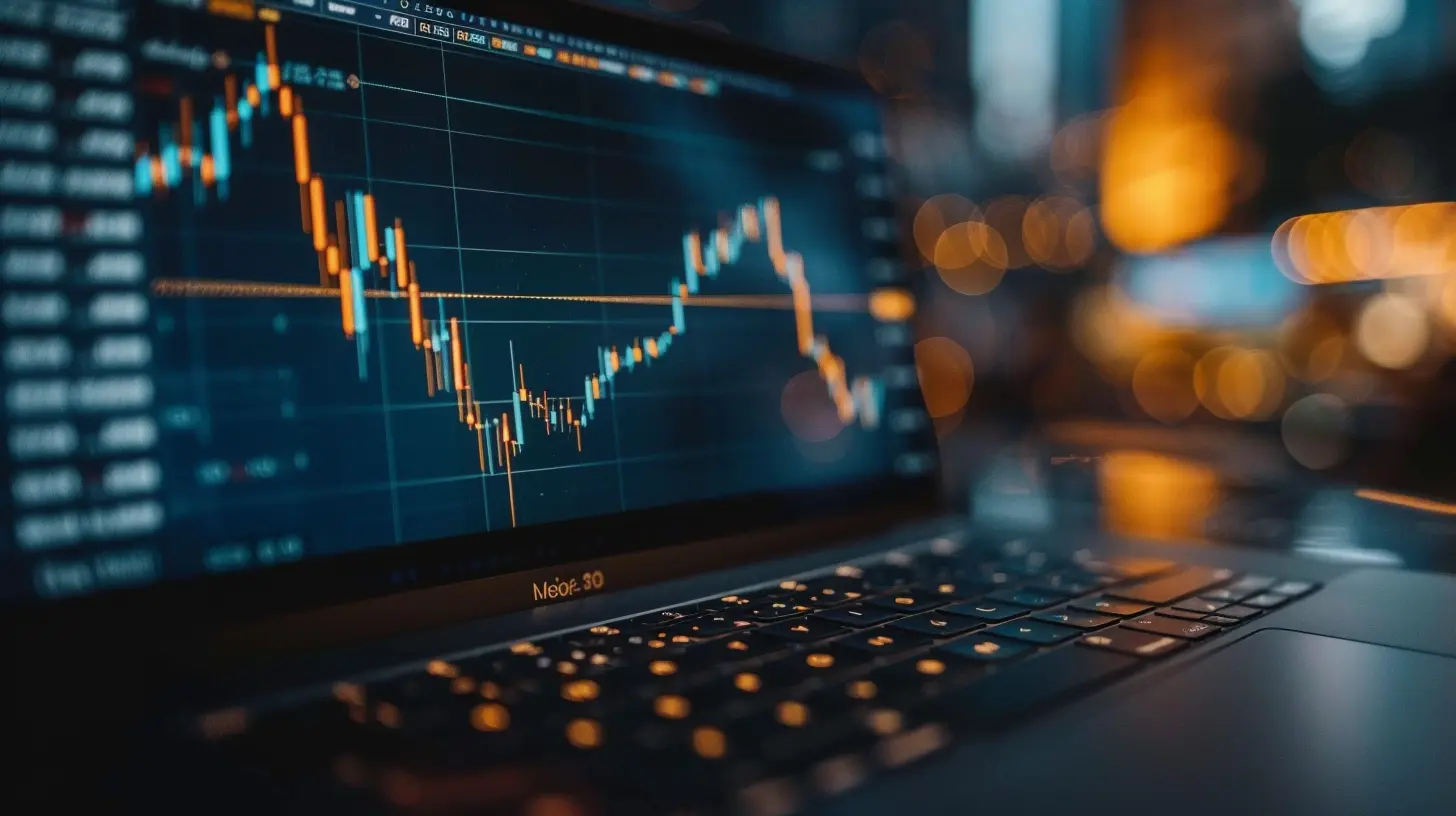How Blockchain is Reducing Fraud in Financial Markets
17 November 2024
The rise of blockchain technology has stirred up conversations across various industries, but nowhere is its impact more profound than in the financial markets. Financial fraud has been a persistent issue for decades, costing companies and individuals billions of dollars. However, with the arrival of blockchain, things might finally be shifting in a more secure direction. But what exactly is blockchain, and how is it making financial markets more secure and less vulnerable to fraud? Let's dive in.

Understanding Blockchain: The Basics
Before we get into the nitty-gritty, let’s first break down what blockchain actually is. Picture a digital ledger — like the kind you might use to track your expenses or keep tabs on your bank account. Now, imagine that this ledger is not held by one central authority (like a bank or a government), but rather spread across a network of computers. Each time a transaction is made, it is verified by multiple computers in the network, and once it's confirmed, it gets added to the ledger permanently.That’s blockchain in a nutshell — a decentralized, distributed ledger that records transactions in a way that’s transparent and tamper-proof.
Why Decentralization Matters
In traditional financial systems, transactions are typically processed by a central authority, like a bank or a clearinghouse. This creates a single point of failure, making it easier for fraudsters to manipulate records or create fake transactions. Blockchain, on the other hand, operates across a decentralized network, reducing the likelihood of any single entity being able to alter the records.Think of it like a game of telephone where everyone gets to hear the original message. There’s less chance for someone in the middle to mess with the details because everyone can easily confirm if something doesn’t add up.

The Major Types of Financial Fraud
Before we dive into how blockchain fights fraud, let’s identify the common types of fraud that plague financial markets:1. Insider Trading: This occurs when someone with access to non-public information about a company exploits that data to make profitable trades.
2. Market Manipulation: Individuals or groups can artificially inflate or deflate stock prices to gain financially.
3. Identity Theft: Fraudsters steal personal information to gain unauthorized access to financial accounts.
4. Ponzi Schemes: A form of fraud that involves paying returns to earlier investors with the capital raised from newer investors.
5. Accounting Fraud: Corporations falsify financial records to mislead investors and regulators.
Each of these forms of fraud can have devastating consequences for both individuals and the economy. So, how does blockchain step in to prevent these issues?

How Blockchain is Reducing Financial Fraud
1. Transparency and Immutable Records
One of the key features of blockchain is its transparency. All transactions are visible to every participant in the network, which means there’s no room for shady backdoor deals or hidden transactions. Once a transaction is recorded on a blockchain, it cannot be altered or deleted. This immutability makes it nearly impossible for fraudsters to tamper with financial data.Imagine trying to change a grade on a school report card after it's been printed and handed out to everyone in the class. It’s not going to happen! Similarly, blockchain ensures that once a transaction is made, it becomes a permanent part of the record.
This transparency is a game-changer for financial markets because it allows regulators, investors, and companies to monitor transactions in real-time, making fraud detection much easier and quicker.
2. Eliminating Middlemen
In traditional financial transactions, there are usually multiple intermediaries — brokers, banks, clearinghouses, you name it. Each of these middlemen not only adds complexity but also increases the potential for fraud.Blockchain removes the need for many of these intermediaries by allowing peer-to-peer transactions directly between parties. Without these gatekeepers, there’s less opportunity for fraudsters to exploit weak points in the system.
Think of it like booking a vacation. Instead of going through a travel agent, you can book your flights, hotel, and activities directly online. Fewer middlemen mean fewer chances for someone to mess with your bookings — or in the case of financial markets, your money.
3. Smart Contracts: Automating Trust
Smart contracts are self-executing contracts with the terms of the agreement directly written into code. These contracts automatically execute when specific conditions are met, without needing human intervention.For example, if you’re trading stocks, a smart contract could be set up to automatically transfer funds once the stock price hits a certain level. Once that condition is met, the contract executes, and the transaction is completed. No need for a third party, and no chance for someone to alter the terms of the deal halfway through.
With smart contracts, the risk of fraud is significantly reduced because the terms of the deal are enforced automatically, making it harder for either party to back out or change the agreement after the fact.
4. Identity Verification: Keeping Fraudsters Out
Identity theft is one of the most widespread forms of fraud in the financial world. Blockchain technology can help reduce this by providing a more secure and tamper-proof way to verify identities.In a blockchain system, each user has a unique cryptographic key, making it nearly impossible for a fraudster to impersonate someone else. Transactions are tied to these cryptographic identities, ensuring that only authorized individuals can access or alter data.
It’s like having a digital lock where only you hold the key — no one else can access your house (or in this case, your financial account) without your permission.
5. Real-Time Auditing and Regulatory Oversight
One of the biggest challenges for regulators is catching fraudulent activity in real-time. Often, by the time fraud is detected, the damage is already done. Blockchain, however, provides real-time access to transaction data, allowing regulators and auditors to monitor activities as they happen.Instead of waiting for quarterly reports or relying on outdated financial statements, regulators can use blockchain to keep an eye on transactions as they occur. This proactive approach means that suspicious activities can be flagged and investigated much faster, reducing the impact of fraud on the market.
6. Tokenization: Securing Assets
Blockchain allows for the "tokenization" of assets. In simple terms, this means converting physical or digital assets (like stocks, bonds, or even real estate) into tokens on a blockchain. These tokens can be traded, tracked, and verified in a secure, transparent manner.With tokenization, ownership of an asset is recorded on the blockchain, making it much harder for fraudsters to create fake ownership documents or manipulate asset values. In essence, tokenization locks down the asset’s identity, ensuring that only legitimate owners can make transactions.

Blockchain in Action: Real-World Examples
Blockchain technology is already being adopted across a wide range of financial sectors to combat fraud. Here are a couple of examples:- Nasdaq and Blockchain: Nasdaq has been experimenting with blockchain technology for its private market, which allows companies to issue and trade shares. Blockchain ensures that these transactions are transparent and fraud-proof.
- JPMorgan Chase’s Quorum: JPMorgan Chase has developed its own blockchain platform, Quorum, which is used to securely process financial transactions. The aim is to enhance security and reduce fraud in cross-border payments.
These examples highlight the real-world potential of blockchain in making financial markets more secure, transparent, and fraud-resistant.
Challenges Ahead: Is Blockchain a Silver Bullet?
While blockchain offers a lot of promise in reducing fraud, it’s not without its challenges. Implementing blockchain on a large scale presents significant technical and regulatory hurdles. For one, blockchain networks require substantial computational power, which can be costly and energy-intensive.Additionally, since blockchain is still a relatively new technology, there’s a lack of standardization across different platforms. This means that integrating blockchain with existing financial systems can be complicated and time-consuming.
And let’s not forget the human element. While blockchain can reduce fraud, it cannot eliminate the possibility of human error or malicious intent. Scams, phishing attacks, and other forms of cyber fraud will still pose a risk.
The Future of Blockchain in Financial Markets
Despite these challenges, blockchain is undoubtedly here to stay. As the technology continues to evolve, we can expect even more innovative ways to secure financial transactions and reduce fraud. With its ability to provide transparency, security, and efficiency, blockchain is poised to reshape the financial markets in a way that makes fraud a thing of the past.
Conclusion: A Game-Changer for Financial Security
Blockchain is not just a buzzword — it's a revolutionary technology that has the potential to make financial markets more secure and less prone to fraud. By offering transparency, reducing the need for intermediaries, and automating transactions through smart contracts, blockchain is addressing many of the vulnerabilities that fraudsters have exploited for years.While it’s not a silver bullet, the combination of blockchain’s decentralized nature and its ability to provide real-time auditing and secure identities makes it a powerful tool in the fight against fraud. As adoption grows and technology matures, blockchain could very well become the backbone of a fraud-free financial world.
###
all images in this post were generated using AI tools
Category:
Blockchain TechnologyAuthor:

Reese McQuillan
Discussion
rate this article
24 comments
Kingston Smith
Who knew blockchain could moonwalk its way into financial markets, dodging fraud like a pro? It's like giving traditional finance a superhero cape—transforming it from clunky to sleek! Let’s hope it doesn’t trip on its own transparency while saving the day!
February 3, 2025 at 4:36 AM

Reese McQuillan
Thank you! Blockchain truly is revolutionizing finance, enhancing transparency while minimizing fraud. Here's to a smoother, more secure financial future!
Alexa Phelps
As the shadows of deception linger in financial markets, blockchain emerges as a silent guardian. Its decentralized ledger weaves an intricate tapestry of transparency, challenging the very essence of trust in an opaque world.
January 29, 2025 at 8:26 PM

Reese McQuillan
Thank you for your insightful comment! Indeed, blockchain's transparency and decentralization play a crucial role in enhancing trust and mitigating fraud in financial markets.
Brianna McLemore
Promising insights; blockchain's potential in finance is clear.
January 23, 2025 at 12:02 PM

Reese McQuillan
Thank you! I'm glad you found the insights valuable. Blockchain indeed holds great promise for enhancing transparency and reducing fraud in finance.
Isaac Daniels
Great insights! It's encouraging to see how blockchain technology is enhancing transparency and trust in financial markets, reducing fraud effectively.
January 19, 2025 at 9:45 PM

Reese McQuillan
Thank you! I'm glad you found the insights valuable. Blockchain's potential to enhance transparency and trust is indeed transformative for financial markets.
Ellie Lozano
Great insights! It's encouraging to see how blockchain technology can enhance transparency and security in financial markets. Thank you!
January 15, 2025 at 5:30 AM

Reese McQuillan
Thank you for your kind words! I'm glad you found the insights valuable. Blockchain's potential for enhancing transparency and security is indeed exciting!
Chantal Conrad
Imagine a world where money doesn't vanish like socks in a dryer! Blockchain is like a digital superhero, battling fraud in financial markets with its trusty sidekick, transparency. Say goodbye to shady transactions!
January 12, 2025 at 12:40 PM

Reese McQuillan
Absolutely! Blockchain's transparency and security are revolutionizing finance, making transactions reliable and reducing fraud significantly.
Cerys McKay
Blockchain enhances transparency, building trust and significantly mitigating financial fraud.
January 10, 2025 at 5:59 AM

Reese McQuillan
Absolutely! Blockchain's transparent nature allows for traceable transactions, fostering trust and significantly reducing opportunities for financial fraud.
Bear Carr
Blockchain's like a bouncer for the financial world—kicking out fraud with style! If you’re still skeptical, maybe it’s time to upgrade your thinking. Welcome to the tech revolution, where transparency is the new black! 💁♀️
January 7, 2025 at 3:20 AM

Reese McQuillan
Absolutely! Blockchain’s transparency and security are game changers in combating fraud. Embracing this tech revolution is crucial for a more trustworthy financial future!
Sebastian McCallum
Sure, just like unicorns!
January 3, 2025 at 12:25 PM

Reese McQuillan
While unicorns may be mythical, blockchain is very real and transforming financial security.
Elwynn McGrath
Blockchain is revolutionizing finance by enhancing transparency and trust. Embrace this innovative technology as it paves the way for a fraud-free future in markets!
December 30, 2024 at 7:58 PM

Reese McQuillan
Thank you for your insightful comment! Indeed, blockchain's transparency and trust-enhancing features are crucial for reducing fraud in financial markets. Embracing this technology is essential for a more secure financial future.
Kaitlin Huffman
This article highlights the transformative potential of blockchain technology in combating fraud within financial markets. By enhancing transparency, enabling secure transactions, and ensuring data integrity, blockchain is paving the way for a more trustworthy financial ecosystem. Exciting developments ahead in financial security!
December 26, 2024 at 5:57 AM

Reese McQuillan
Thank you for your insightful comment! I'm glad you found the article highlights important aspects of blockchain's role in enhancing financial security. Exciting times indeed!
Wolf Weber
Blockchain: because when it comes to fraud, we prefer a digital fortress over a cardboard box! Who knew finance could get a tech-savvy makeover?
December 21, 2024 at 1:56 PM

Reese McQuillan
Absolutely! Blockchain is revolutionizing finance by providing a secure, transparent solution to fraud—truly a tech-savvy upgrade!
Madalyn Whitaker
Great insights on how blockchain technology is transforming financial markets! It's fascinating to see how its transparency and security features can significantly reduce fraud. Looking forward to more innovations in this space!
December 15, 2024 at 8:07 PM

Reese McQuillan
Thank you! I'm glad you found the insights valuable. Exciting times ahead as blockchain continues to evolve in the financial sector!
Roxanne Fields
Blockchain: Unstoppable force against financial fraud!
December 12, 2024 at 1:05 PM

Reese McQuillan
Thank you! Blockchain's transparency and immutability are indeed powerful tools in combating financial fraud.
Garrett McRae
Ah yes, because nothing screams 'trustworthy' like a decentralized ledger where you can’t even remember your password. Who needs banks when you can have a fancy digital maze to navigate instead? Progress, right?
December 9, 2024 at 3:49 AM

Reese McQuillan
I appreciate your perspective! While blockchain may seem complex, its transparency and security can significantly reduce fraud compared to traditional systems.
Darby Soto
Absolutely loved this article! 🌟 It’s exciting to see how blockchain technology is revolutionizing financial markets by enhancing transparency and reducing fraud. The potential for creating a more secure financial future is immense! Can’t wait to see how this evolves. Keep up the fantastic work, tech innovators! 🚀💰
November 30, 2024 at 5:32 AM

Reese McQuillan
Thank you for your kind words! I’m glad you enjoyed the article. The advancements in blockchain truly hold great promise for the future of finance! 🚀
Laura McKinley
Great insights on the transformative role of blockchain in enhancing transparency and security within financial markets. Your analysis highlights its potential to significantly reduce fraud, paving the way for more trust and efficiency in financial transactions. Thank you for sharing!
November 27, 2024 at 8:39 PM

Reese McQuillan
Thank you for your kind words! I'm glad you found the analysis insightful. Blockchain truly has the potential to revolutionize financial transactions.
Upton Erickson
Sure, because nothing says 'trustworthy' like a digital ledger that requires more power than my morning coffee. Can't wait for my accountant to start mining in his basement!
November 26, 2024 at 4:23 AM

Reese McQuillan
While blockchain does require energy, its decentralized nature enhances transparency and accountability, ultimately reducing fraud in financial markets. It's a trade-off for greater security.
Rook Nguyen
This article clearly outlines the transformative potential of blockchain in combating fraud in financial markets. The real-time transparency and immutability it offers are essential for enhancing trust and security in transactions. A promising future for finance!
November 24, 2024 at 9:51 PM

Reese McQuillan
Thank you for your insightful comment! I'm glad you found the article highlights on blockchain's potential for enhancing trust and security in financial markets valuable.
Arianth McEachern
Blockchain technology enhances transparency and security in financial markets, significantly reducing opportunities for fraud. By enabling decentralized and immutable record-keeping, it fosters trust among participants and streamlines transactions, ultimately safeguarding assets and ensuring compliance with regulatory standards. This innovation is reshaping financial integrity.
November 21, 2024 at 9:04 PM

Reese McQuillan
Thank you for your insightful comment! Indeed, blockchain's decentralized nature and immutability play a crucial role in enhancing trust and security in financial markets, significantly mitigating fraud risks.
Rhiannon McAndrews
Blockchain's transparency and immutability are revolutionizing financial markets by enhancing trust and accountability. As adoption grows, we can expect a significant reduction in fraud and a more secure financial ecosystem.
November 20, 2024 at 1:10 PM

Reese McQuillan
Thank you for your insightful comment! Indeed, blockchain's unique features are pivotal in fostering trust and accountability in financial markets, ultimately leading to a safer environment for all participants.
Morrow Heath
Blockchain technology enhances transparency and traceability in financial markets, enabling real-time transaction verification and immutable record-keeping. These features significantly mitigate fraud risk, fostering trust among participants and streamlining compliance processes.
November 17, 2024 at 8:00 PM

Reese McQuillan
Thank you for your insightful comment! Indeed, blockchain's transparency and immutability are crucial for enhancing trust and reducing fraud in financial markets.
Jett Snyder
Great read! It's fascinating to see how blockchain technology is shaking up the financial world by boosting transparency and trust. As we embrace these innovations, we can look forward to a future where fraud is significantly reduced. Keep sharing these insights—every step counts toward a more secure financial landscape!
November 17, 2024 at 1:34 PM

Reese McQuillan
Thank you for your insightful comment! I'm glad you found the article helpful in understanding blockchain's potential to enhance transparency and reduce fraud in finance. Your support means a lot!
Kane Lamb
Blockchain: the digital bouncer we all need at the financial club, keeping out the shady characters while letting the honest folks dance! 💃🕺 #NoMoreFraud
November 17, 2024 at 4:18 AM

Reese McQuillan
Thank you! Blockchain truly acts as a trusted gatekeeper, enhancing transparency and security in financial markets. 💡
MORE POSTS

For the Data Scientists: The Best Laptops for Machine Learning and AI

Video Editing for Podcasts: Tools for Visual Storytelling

How 5G Could Transform the Entertainment Industry

What Is the Role of Fiber Optics in Modern Data Centers?

How Space Tourism Will Be Powered by Cutting-Edge Tech

How Digital Transformation is Redefining Customer Expectations

Hidden Gems: Lesser-Known Video Editing Tools You Should Try

The Future of Drones: From Delivery to Disaster Relief

Smart Displays and Energy Efficiency: Saving Power with Smart Tech

How to Secure Data in Transit vs. Data at Rest

G and Its Role in Revolutionizing the Travel Industry

Quantum Cloud Platforms: What You Need to Know

The Future of Biometric Security in Data Protection

How to Secure Your Data on Mobile Devices